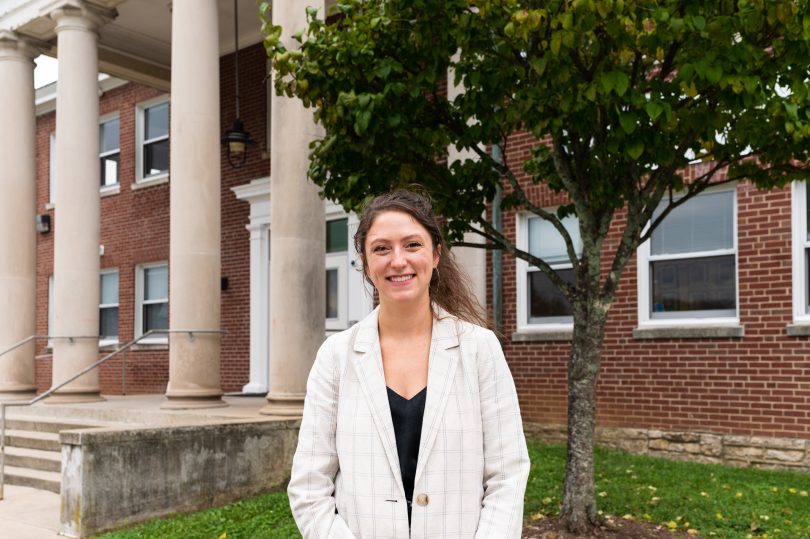
After finishing her master’s in education at Vanderbilt and her Fulbright teaching assistantship in Mulhouse, France, Transylvania University anthropology and French double major Jamie Vescio ’17 was ready for her first teaching position in the U.S. Through Brian Arganbright, her French professor at Transy, she learned of a unique opportunity to teach math to kindergartners in Kentucky’s first French immersion program at Whitney Young Elementary in Louisville, Kentucky.
As with her experience teaching English to high school students in France, Vescio found teaching math in French — to kindergartners who had no background in either subject — the kind of challenge that requires rigorous creativity. How would she communicate?
“Teaching math in French forced me to be extremely hands on,” Vescio says, “to do lots of visuals, to sing lots of songs and to really step out of my own comfort zone with new and creative ways for reaching them.” Because she couldn’t simply talk through an abstract equation with her students, she had to devise more concrete ways of reaching them. “It was a really wonderful experience.”
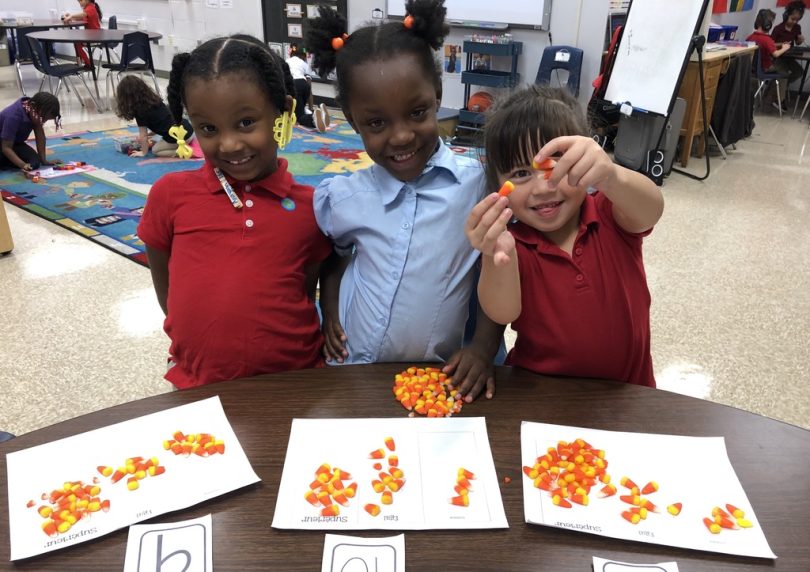
Using imagination is something that comes naturally to someone who spent her formative years as a student at Lexington’s School for the Creative and Performing Arts and her undergraduate years in the liberal arts at Transy. Understanding the power of the arts, creativity and empathy in her own education helped propel her toward education as a profession. “Getting that exposure at such a young age was really, really important,” she notes. So, when a position opened at SCAPA, she knew she had to apply — even in the midst of a pandemic.
Becoming SCAPA’s French teacher for fifth through eighth graders returned Vescio to familiar territory. But the work required another shift in her approach to teaching. At SCAPA, all instruction links in some way to the creative arts and to the individual talents of each student. As well, Vescio is a math RTI (response to intervention) teacher for fourth and fifth graders, providing math instruction to students who might need more support.
However, teaching is rarely limited to the subject matter at hand. Life, a pandemic, trauma and inequity can overwhelm a daily lesson plan. Knowing how to recognize and navigate these challenges is what leads to a productive classroom.
During this COVID-19 period of teaching her SCAPA students remotely, Vescio has worked hard to offer emotional support to her students who feel the anxiety of being separated from their community and their ability to fully express their art. She’s derived ways of offering them choice and ownership in assignments when so little else is within their control. She creates multiple options within French language practice that resonate with the individual talents of her students and give them outlets for their creativity and emotions — whether it’s through drama or music, visual arts or creative writing.
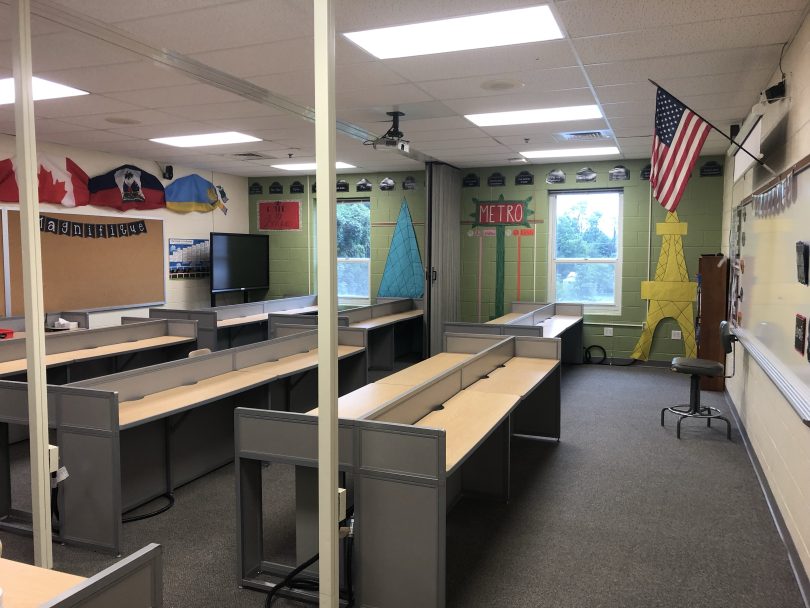
She also uses her knowledge of French society and culture as a way for her class to contrast and better understand their own circumstances. “France, in terms of conversations in the classroom, is a good microcosm to study when comparing their challenges and injustices to those currently happening in the U.S.,” she explains. Having those difficult conversations is possible, she adds, because of the examples provided in her anthropology classes at Transy.
“Had I not had a strong anthropology background and the examples of my professors who facilitated incredible conversations around topics like racial injustice in my Transy classrooms,” she says, “I would have been a bit more intimidated to lead those types of conversations in my current classes.” The training also has helped her serve on SCAPA’s equity committee, working to address the lack of diversity that defines so many magnet programs. But it particularly awakened her sense of inequity in the classroom.
“Although my interest in addressing inequity is often through the lens of education, I think probably without realizing it, I was already starting to develop this interest when discussing gender and race in my anthropology classes.”
With her kindergartners in Louisville, she learned first-hand the importance of seeing the whole child and understanding the interests and experiences the young lives brought with them into the classroom. If a student was crying or not having a good day, instead of thinking of it as a disruption, she says, “I had to really break down where that trauma or distress was coming from, because many of my students lived in very challenging circumstances that had to be considered before even thinking about what we were going to learn in math or French for that day.”
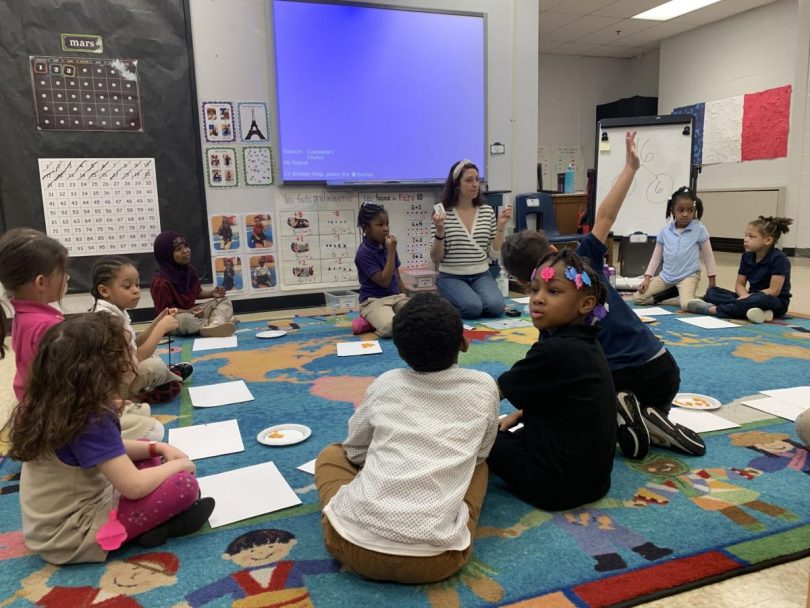
Equity requires effort and reprioritizing whose interests should dominate. As Vescio prepares lessons, she says, “I am trying to think about all of my students and to create a learning environment that is as inclusive as possible.” That means challenging what she thinks of as the “normal” experience of most students and trying to think “through the lens of each of my individual students and their experiences. Whenever I plan lessons I really love to draw on students’ experiences and interests.”
Having these very different teaching experiences within the first three years of her professional life has given Vescio precisely the “fieldwork” (to use the parlance of her anthropology training) she’d hoped to gain before pursuing the more theoretical aspects of a Ph.D. In the process, while drawing on the full breadth of her liberal arts foundation, she has found the pull of inquiry increasingly bent toward math education for young students.
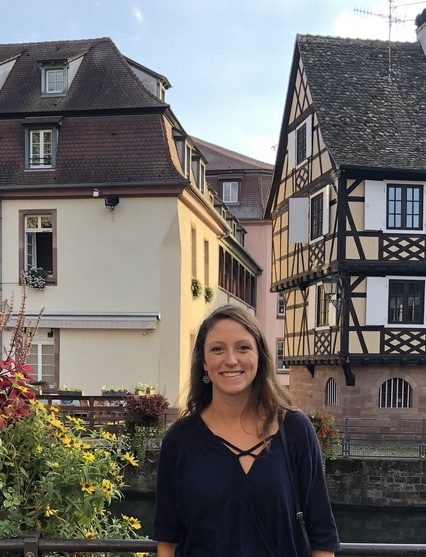
“With each experience it’s become more and more nuanced. And I’ve come up with more questions I’d love to explore eventually,” she says. “I would love to research more ways of making math experiences more equitable for students,” especially for primary-aged students, “because it’s easy for them to quickly identify as being good or not good in math, and that distinction often creates gender- and racial-based consequences.” She learned that during her time at Whitney Young. At SCAPA, she says she wants to take that further.
“I’d love to research different ways of defining what it means to be ‘smart’ in math and to help students change their perceptions of what math is and what it can be in the classroom,” Vescio explains. She finds inspiration in the creative freedom that her performing arts school allows and the way that “everything is so redefined” in how teachers teach and students learn. In this environment, she hopes to develop more ways to engage students with math.
Ultimately, she says, “I’m interested in combining all of these experiences and finding an area within math education that can benefit from what I’ve learned about arts education, but also about inequity within education for younger students.”
Making the next generation at ease with math? Creating an equitable system? Vescio is up to the challenge.

